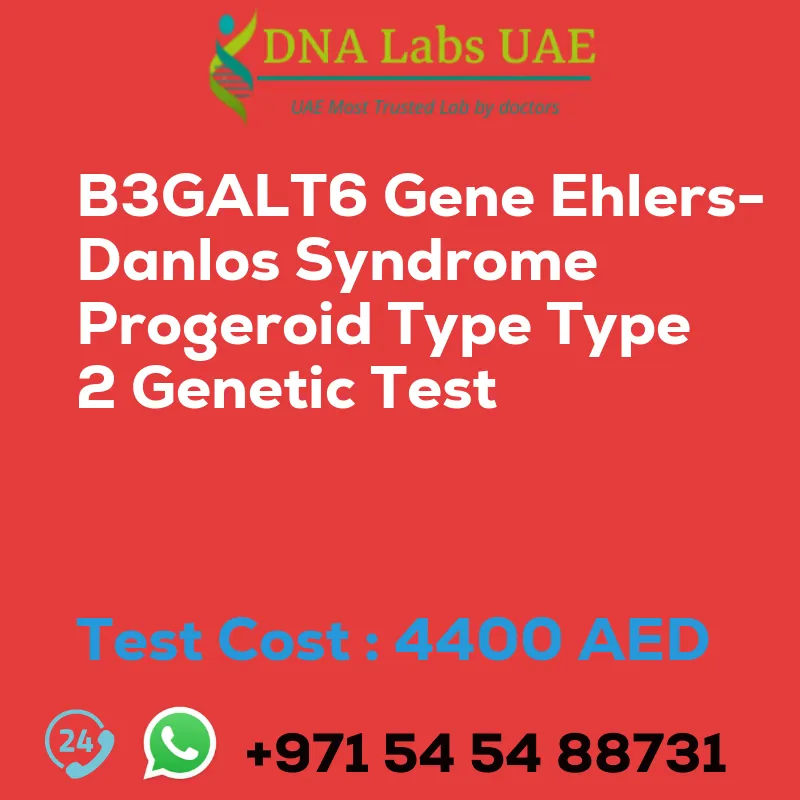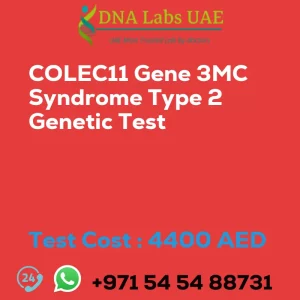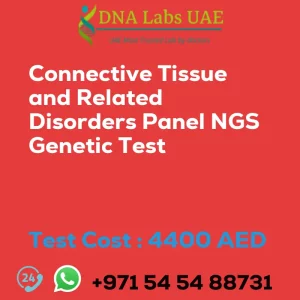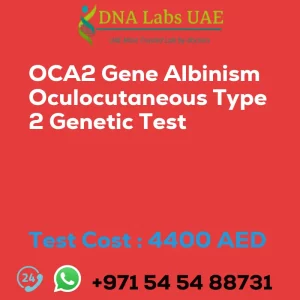B3GALT6 Gene Ehlers-Danlos Syndrome Progeroid Type Type 2 Genetic Test
Test Name: B3GALT6 Gene Ehlers-Danlos Syndrome Progeroid Type Type 2 Genetic Test
Components: Blood or Extracted DNA or One drop Blood on FTA Card
Price: 4400.0 AED
Report Delivery: 3 to 4 Weeks
Method: NGS Technology
Test Type: Osteology Dermatology Immunology Disorders
Doctor: Dermatologist
Test Department: Genetics
Pre Test Information: Clinical History of Patient who is going for B3GALT6 Gene Ehlers-Danlos syndrome, progeroid type, type 2 NGS Genetic DNA Test. A Genetic Counselling session to draw a pedigree chart of family members affected with B3GALT6 Gene Ehlers-Danlos syndrome, progeroid type, type 2 NGS Genetic DNA Test gene B3GALT6
Test Details: The B3GALT6 gene is associated with a rare genetic disorder called Ehlers-Danlos syndrome, progeroid type, type 2. This syndrome is characterized by symptoms similar to premature aging, such as thin and translucent skin, joint hypermobility, short stature, and facial features that resemble those seen in older individuals. It is caused by mutations in the B3GALT6 gene, which is involved in the production of a protein called galactosyltransferase II.
NGS (Next-Generation Sequencing) genetic testing is a type of genetic testing that uses advanced sequencing technology to analyze multiple genes simultaneously. In the case of Ehlers-Danlos syndrome, progeroid type, type 2, NGS genetic testing can be used to identify mutations in the B3GALT6 gene. This can help confirm a diagnosis and provide information about the specific genetic changes present in an individual.
NGS genetic testing is typically performed using a blood or saliva sample. The sample is sent to a laboratory, where the DNA is extracted and sequenced. The resulting genetic data is then analyzed to identify any mutations or variations in the B3GALT6 gene that may be associated with Ehlers-Danlos syndrome, progeroid type, type 2.
It is important to note that genetic testing should be performed by a qualified healthcare professional or genetic counselor, who can provide guidance and support throughout the testing process. The results of genetic testing can have significant implications for an individual and their family, so it is important to understand the potential risks and benefits before undergoing testing.
| Test Name | B3GALT6 Gene Ehlers-Danlos syndrome progeroid type type 2 Genetic Test |
|---|---|
| Components | |
| Price | 4400.0 AED |
| Sample Condition | Blood or Extracted DNA or One drop Blood on FTA Card |
| Report Delivery | 3 to 4 Weeks |
| Method | NGS Technology |
| Test type | Osteology Dermatology Immunology Disorders |
| Doctor | Dermatologist |
| Test Department: | Genetics |
| Pre Test Information | Clinical History of Patient who is going for B3GALT6 Gene Ehlers-Danlos syndrome, progeroid type, type 2 NGS Genetic DNA Test. A Genetic Counselling session to draw a pedigree chart of family members affected with B3GALT6 Gene Ehlers-Danlos syndrome, progeroid type, type 2 NGS Genetic DNA Test gene B3GALT6 |
| Test Details |
The B3GALT6 gene is associated with a rare genetic disorder called Ehlers-Danlos syndrome, progeroid type, type 2. This syndrome is characterized by symptoms similar to premature aging, such as thin and translucent skin, joint hypermobility, short stature, and facial features that resemble those seen in older individuals. It is caused by mutations in the B3GALT6 gene, which is involved in the production of a protein called galactosyltransferase II. NGS (Next-Generation Sequencing) genetic testing is a type of genetic testing that uses advanced sequencing technology to analyze multiple genes simultaneously. In the case of Ehlers-Danlos syndrome, progeroid type, type 2, NGS genetic testing can be used to identify mutations in the B3GALT6 gene. This can help confirm a diagnosis and provide information about the specific genetic changes present in an individual. NGS genetic testing is typically performed using a blood or saliva sample. The sample is sent to a laboratory, where the DNA is extracted and sequenced. The resulting genetic data is then analyzed to identify any mutations or variations in the B3GALT6 gene that may be associated with Ehlers-Danlos syndrome, progeroid type, type 2. It is important to note that genetic testing should be performed by a qualified healthcare professional or genetic counselor, who can provide guidance and support throughout the testing process. The results of genetic testing can have significant implications for an individual and their family, so it is important to understand the potential risks and benefits before undergoing testing. |








